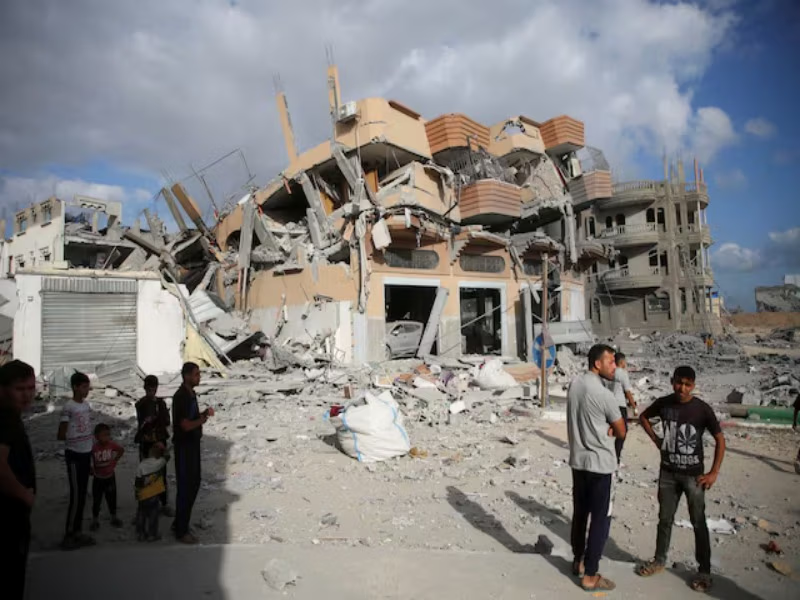As the war following the Hamas attacks on Israel enters its third year, international demands are growing to end the conflict, stop the bloodshed, and ensure aid reaches Gaza.
These calls are gaining momentum, particularly in light of intentions expressed by US President Donald Trump to broker a ceasefire in Gaza. The Israeli campaign, described by the UN and large aid organizations as genocide, continues to draw attention.
Discussions on the Egyptian resort city of Sharm El Sheikh started on Monday in order to talk about the specifics of Trump’s plan. Israel has accepted it, but Hamas has made positive reactions to major aspects and requires clarification on other aspects.
According to the sources, The National reported that the two key areas of contention are what to do with Hamas weapons and the burial sites of some of the dead hostages.
Egyptian state-linked Al Qahera news reported early on Tuesday that he initial stage of the negotiations was terminated “amid a positive atmosphere.”
Trump also stated that he was “pretty sure” that some sort of deal would be struck to bring about the end of the war and that it would also carry over to other extended peace in the entire region.
In conversation with the King of Jordan, Trump said, “I spoke with President Erdogan of Turkey. He’s fantastic. He’s been pushing very hard [for a deal]… and Hamas has a lot of respect for him. They have a lot of respect for Qatar, the UAE, and Saudi Arabia.”
In addition to the conversation, it was reported that the discussions are to proceed, mediators between Egypt, Qatar, and Turkey will also be requesting a US assurance that Israel will keep a ceasefire in Gaza once Hamas turns over the hostages as part of the 20-point plan outlined by Trump last week.
International Committee’s President, Mirjana Spoljaric, said on Monday that “A lasting ceasefire is critical to saving lives and breaking the cycle of death and destruction. Humanitarian assistance must resume at full capacity and be distributed safely to people in need, wherever they are.”
President Abdel Fattah El Sisi of Egypt indicated that true peace in the Middle East “will not be realised except when a Palestinian state is established.” The proposal presented by Trump was capable of putting the region on a “permanent peace and lasting stability,” added El Sisi.
However, even as new optimism of a breakthrough and Israel being urged by Trump to cease its offensive, Israeli troops have been shelling Gaza. Since the plan was announced last week, dozens of Palestinians have been killed. The aid is trickling in, and famine is raging in the enclave, which is under siege.
About seven Palestinians were killed in Israeli attacks in Gaza on Monday. In the 15th MSF member killed since the war started, the medical charity Doctors Without Borders (MSF) reported that one of its Gaza staff had been killed in a previous Israeli attack.
In a conversation with The National after a recent visit to Gaza, Director General of MSF France, Claire Magone, described what started as a carpet-bombing operation by Israel on October 7, 2023, turned into a “loud and clear genocide” against Palestinians.

With the war in its third year, there is mounting controversy as to whether Israel is really “winning” the war in Gaza, which is the longest war it has ever had in its history.
Nimrod Novik, an Israeli peace negotiator and former senior adviser to the late prime minister Shimon Peres, reported The National that “It’s a mixed bag. I don’t think there is a way out of the very bottom line that we lost the war on October 7.”
A similar opinion was expressed by Former Senior Diplomat Alon Pinkas, who claimed Israel was exaggerating its achievements in the region. He added that “In his mind, he’s winning because he deludes himself into thinking that he actually reshaped the Middle East, but it was temporary.”
The growing isolation of Israel, the charges of genocide, and the outbursts of allies have caused what Israelis are calling a “diplomatic tsunami.” The word became weighty when most of the closest Western allies of Israel recognised a Palestinian state.
According to a poll conducted by one of the leading think tanks, the Israel Democracy Institute, there was a “notable shift” in the perception of the population.
Although a multifront war is the highest priority, the concern of being isolated by others, “international isolation and boycotts,” has increased more than twice in the last year, and the fear of “losing US support” has increased almost twice.
A survey conducted by the New York Times revealed that the support of Israel among US voters has fallen by 13 percent in the last year.
A Washington Post poll indicated that 61 percent of American Jews view that Israel has perpetrated war crimes, and some 4 out of every ten indicated that it was guilty of genocide.
On its part, two years of war and a series of assassinations that left most of its top officials no longer than survivors have placed Hamas in survival mode.
Sources with direct access to its leadership reported to The National that the group is disorganized, its chain of command is not functioning, and that it only interacts with fighters in Gaza and political leaders outside the country sporadically.
According to one of the sources, “Hamas is at its weakest ever. The only bargaining chip it now has is the hostages. Militarily, only a negligible number of active fighters are left in the field.”
The greatest victim has been Palestinians in Gaza, since the Hamas attacks that killed approximately 1200 Israelis, the Israeli army has killed over 66,000 people and injured at least 169,000 others.
Global frustration with Israel’s prolonged war is rising, as demands for a ceasefire and accountability intensify. Arab diplomats interviewed by The National question whether the Trump plan can truly end the conflict or if it will be another failed peace effort, underscoring the ongoing uncertainty over the path to resolution.






